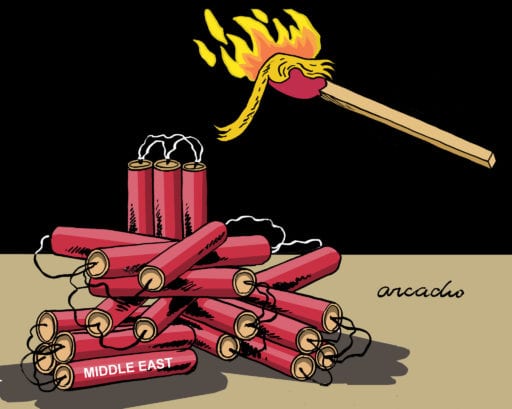BY NYLA ALI KHAN
 Sometimes it helps to see the world through the eyes of a child.
Sometimes it helps to see the world through the eyes of a child.
Contrary to popular opinion, Iraq and Iran were not benighted regions of the world, nor were their peoples barbaric and savage.
I had the good fortune of visiting Iraq with my family in April-May 1980, prior to the decade-long Iraq-Iran war. At the time, Iraq was a powerful ally of the United States. And the sectarian conflict that is threatening to reduce the country to rubble now hadn’t created cleavages of identity back then.
Since this was an official visit, it was considered an expression of friendly bilateral relations and was characterized by an emphasis on protocol and ceremony. Everywhere we went, we were accompanied by translators assigned to us by the Ministry of External Affairs.
As state guests, we stayed at the palace across the street from Al-Rashid Hotel in Baghdad. I vividly remember and have pictures of the opulent palace complex, with its beautifully manicured lawns, caverns, and water cascades.
Iraq was the hub of Islamic civilization at the time, and we visited every site of historical and religious significance.
I remember the grandiose structures; pennants around edifices; beautifully carved friezes around imposing domes; and the utmost reverence with which my family paid obeisance at Karbala, Najaf, Kufa, and the mausoleum of Hazrat Abdul-Qadir Gilani, aka Dastageer Sahab.
Our visit to Basra was just as magical. As a child, I was fascinated to be in the city which was one of the ports from which the fictional Sindbad embarked on his voyage.
On our return from Saudi Arabia, after having performed Umrah [pilgrimage to Mecca and Medina], we found Iraq embroiled in war with its neighbor. It was a war in which the United States had Iraq’s back. The palace complex was particularly vulnerable then, so we stayed at Al-Mansur Melia Hotel, overlooking the Tigris river.
Marshal Tito, president of former Yugoslavia, died the day we were scheduled to fly back to New Delhi, and all commercial flights were canceled. I got to spend a couple more magical days on the banks of the Tigris River.
History is not seamless, nor is it all gory. Politics have never been black and white, and let’s not overlook the richness of old and great civilizations.
– Nyla Ali Khan is the author of Fiction of Nationality in an Era of Transnationalism, Islam, Women, and Violence in Kashmir, The Life of a Kashmiri Woman, and the editor of The Parchment of Kashmir. She also has served as a guest editor working on articles from the Jammu and Kashmir region for Oxford University Press [New York], helping to identify, commission, and review articles. Nyla Khan is a Commissioner of the Oklahoma Commission on the Status of Women. She can be reached at nylakhan@aol.com.







